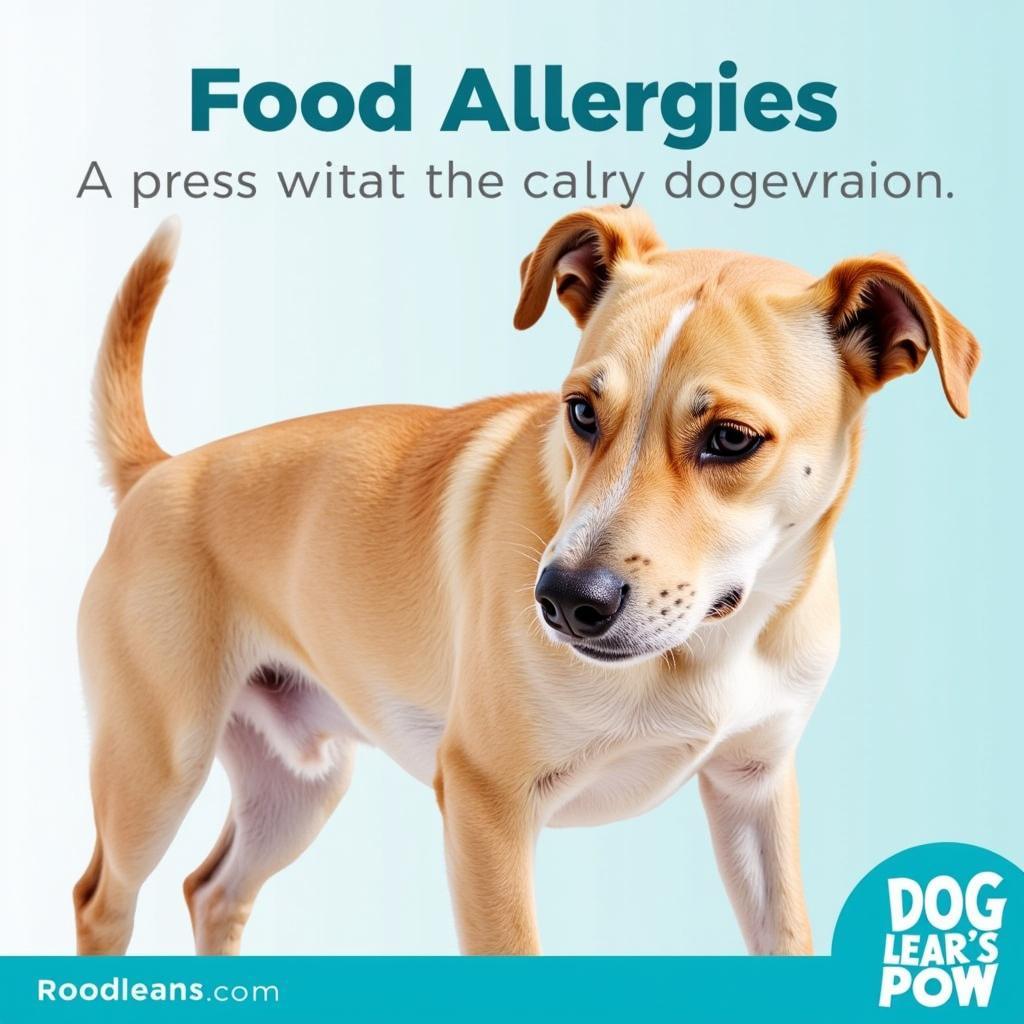Raw dog food diets are gaining popularity, especially for dogs with allergies. This comprehensive guide explores the benefits and challenges of Raw Dog Food For Dogs With Allergies, helping you make an informed decision about your furry friend’s nutrition.
Understanding Food Allergies in Dogs
Before diving into the specifics of raw food, it’s crucial to understand canine food allergies. Unlike environmental allergies, food allergies are triggered by the proteins in a dog’s food. Common allergens include beef, chicken, dairy, wheat, and soy. Symptoms can range from itchy skin and ear infections to gastrointestinal issues like vomiting and diarrhea. Identifying the specific allergen often requires an elimination diet, working with your veterinarian.
 Dog scratching its ear due to a food allergy
Dog scratching its ear due to a food allergy
The Potential Benefits of Raw Dog Food for Allergies
Many pet owners turn to raw dog food for allergy relief because it often involves single-source protein options and eliminates common processed ingredients. By carefully selecting novel proteins like venison, rabbit, or kangaroo, owners can pinpoint and avoid allergens. This elimination process can significantly reduce allergic reactions. Additionally, raw diets often boast improved digestion, shinier coats, and increased energy levels. Some believe that raw food provides dogs with natural enzymes and nutrients often lost in commercial kibble. If you’re looking into a balanced raw diet, check out resources like Tuckers dog food.
Is Raw Food the Magic Bullet?
While raw food can be beneficial, it’s not a guaranteed cure-all. Some dogs may still have allergies to novel proteins, and it’s vital to work with a veterinary nutritionist to develop a balanced raw diet. Improperly balanced raw diets can lead to nutritional deficiencies.
Choosing the Right Raw Dog Food for Your Allergic Dog
Selecting the right raw food involves careful consideration of the ingredients. Look for single-source protein options and avoid any ingredients your dog is known to be allergic to. It’s essential to prioritize high-quality ingredients from reputable sources. Remember to consult your vet or a veterinary nutritionist before transitioning your dog to a raw diet. They can help you navigate the process safely and effectively. Activa dog food is another option to explore when choosing the right food.
Transitioning to a Raw Diet
Switching to a raw diet should be gradual to minimize digestive upset. Start by introducing small amounts of raw food mixed with your dog’s current food, gradually increasing the raw portion while decreasing the old food. Monitor your dog closely for any signs of allergies or digestive issues. If your dog experiences any adverse reactions, discontinue the raw food and consult your vet. Perhaps Chicken Soup for the Soul canned dog food could be a suitable alternative.
How do I prepare raw dog food safely?
Safe handling and storage are crucial to prevent bacterial contamination. Always wash your hands thoroughly after handling raw meat, and clean all surfaces and utensils that have come into contact with the food. Store raw food appropriately in the freezer or refrigerator.
Potential Risks of Raw Dog Food Diets
While raw diets can offer benefits, it’s important to be aware of the potential risks. Raw meat can carry harmful bacteria like Salmonella and E. coli, which can pose a risk to both dogs and humans. Nutritional imbalances are another concern, especially if the diet isn’t properly formulated.
Conclusion
Raw dog food for dogs with allergies can be a viable option, but it requires careful planning, preparation, and monitoring. By working closely with your veterinarian or a veterinary nutritionist, you can determine if a raw diet is suitable for your dog and develop a balanced plan to address their allergies and overall health. Remember to prioritize food safety and choose high-quality ingredients from reputable sources. Looking for a trusted source for pet food? Check out Bonnihill farms pet food.
FAQ
- What are the most common signs of food allergies in dogs? Itchy skin, ear infections, gastrointestinal upset.
- Is raw food a guaranteed cure for dog allergies? No, some dogs may still react to novel proteins.
- What are the potential risks of raw feeding? Bacterial contamination and nutritional imbalances.
- How do I transition my dog to a raw food diet? Gradually, by mixing small amounts with their current food.
- Where can I find more information on feeding a German Shepherd puppy? Consider checking out best dog food for german shepherd puppy.
Do you have other questions regarding your dog’s allergies and diet? Explore our other articles on dog nutrition and health for more valuable insights.
For further assistance, please contact us: Phone: 02437655121, Email: minacones@gmail.com Or visit us at: 3PGH+8R9, ĐT70A, thôn Trung, Bắc Từ Liêm, Hà Nội, Việt Nam. We have a 24/7 customer service team.